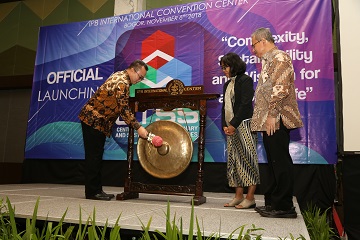IPB Launches the Center for Transdisciplinary and Sustainability Sciences

Bogor Agricultural Institute (IPB) launched Center for Transdisciplinary and Sustainability Sciences (CTSS Center for Transdisciplinary and Sustainability Sciences on Tuesday (6/11) at IPB International Convention Center (IICC), Bogor. The launching of CTSS is a concrete manifestation for IPB in contributing and support to realize the pillars of the Sustainability Development Goals (SDGs).
"This CTSS will be the center of transdisciplinary research in realizing sustainability and becoming a new research center as a center for sustainable science studies," said the Rector of IPB, Dr. Arif Satria.
The Dr. Arif Satria hoped that by launching the CTSS, transdisciplinary research could be carried out continuously and integrated. This is because transdisciplinary research is needed in dealing with very complex life problems. The transdisciplinary research concerns various aspects such as aspects of natural resources, social, cultural, economic and political dimensions.
CTSS Director, Prof. Dr. Ir. Damayanti Buchori, M.Sc, stated that transdisciplinary research is still relatively new, both at the concept level and in practice in Indonesia. The main idea of this transdisciplinary research comes from various academics who have a variety of scientific disciplines working together to solve a problem in a concrete manner. Collaboration in transdisciplinary research includes exchanging information, adjusting approaches from each discipline, sharing resources, and integrating discipline to achieve joint scientific goals.
"Transdisciplinary is a new form of learning system and solving problems that involve collaboration between various communities and academics to face complex challenges," said Prof. Damayanti.
Therefore, continued Prof. Damayanti, mutual learning is an important feature in the process of transdisciplinary research. In principle, anyone who has knowledge of a problem to be resolved has an important role in transdisciplinary research. By learning together, the knowledge of all participants will increase and overall knowledge produced will be greater than the knowledge of each participant field.
In principle, this transdisciplinary research does not only involve academics, but anyone can be involved and contribute to transdisciplinary research. Transdisciplinary research is not only at the local level, but also national, regional and even international. With increasingly complex problems, the resolution of the problem cannot be done partially, so a holistic approach is needed to solve it.
In Indonesia, transdisciplinary research is very necessary because Indonesia has abundant wealth. Not only natural wealth, but also local wealth contained in the motto of Unity in Diversity. With the unification of various elements in transdisciplinary research, including the local community, it is expected to provide a way out for the realization of a new order of knowledge that guarantees the sustainability of the earth's carrying capacity. Not only that, with the unification of various elements in transdisciplinary research, development based on sustainable resources can be realized and can preserved. (jhn)


